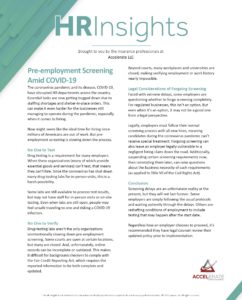The coronavirus pandemic and its disease, COVID-19, have disrupted HR departments across the country.
Essential tasks are now getting bogged down due to staffing shortages and shelter-in-place orders. This can make it even harder for the businesses still managing to operate during the pandemic, especially
when it comes to hiring.
Now might seem like the ideal time for hiring since millions of Americans are out of work. But pre-employment screening is slowing down the process.
No One to Test
Drug testing is a requirement for many employers. When these organizations (many of which provide essential goods and services) can’t test, that means they can’t hire. Since the coronavirus has shut down
many drug-testing labs for in-person visits, this is a harsh possibility.
Some labs are still available to process test results, but may not have staff for in-person visits or on-site testing. Even when labs are still open, people may feel unsafe traveling to one and risking a COVID-19
infection.
No One to Verify
Drug-testing labs aren’t the only organizations unintentionally slowing down pre-employment screening. Some courts are open at certain locations, but many are closed. And, unfortunately, online
records can be incomplete or outdated. This makes it difficult for background checkers to comply with the Fair Credit Reporting Act, which requires the reported information to be both complete and updated.
Beyond courts, many workplaces and universities are closed, making verifying employment or work history nearly impossible.
Legal Considerations of Forgoing Screening
Faced with extreme delays, some employers are questioning whether to forgo screening completely.
For regulated businesses, this isn’t an option. But even when it’s an option, it may not be a good one from a legal perspective. Legally, employers must follow their normal screening process with all new hires, meaning candidates during the coronavirus pandemic can’t receive special treatment. Forgoing screening can also leave an employer legally vulnerable to a negligent hiring claim down the road. Additionally,
suspending certain screening requirements now, then reinstating them later, can raise questions about the business necessity of such requirements (as applied to Title VII of the Civil Rights Act).
Conclusion
Screening delays are an unfortunate reality at the present, but they will not last forever. Some employers are simply following the usual protocols and waiting patiently through the delays. Others are redrafting conditions of employment to include testing that may happen after the start date. Regardless how an employer chooses to proceed, it’s recommended they have legal counsel review their updated policy prior to implementation.
This HR Insights is not intended to be exhaustive nor should any discussion or opinions be construed as professional advice. © 2020 Zywave, Inc. All rights reserved.

Download the “Pre-employment Screening Amid COVID-19”

